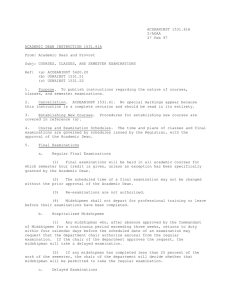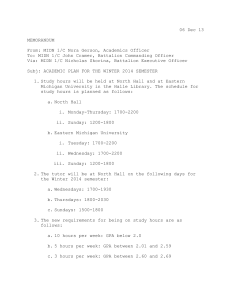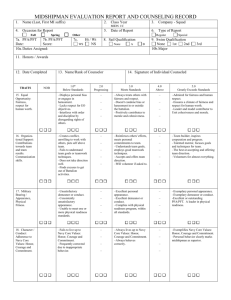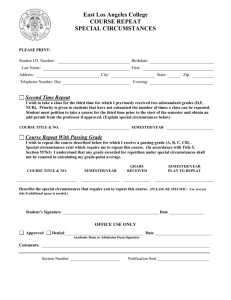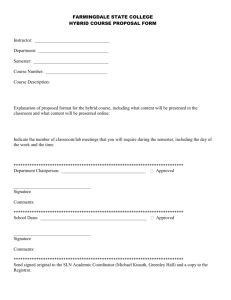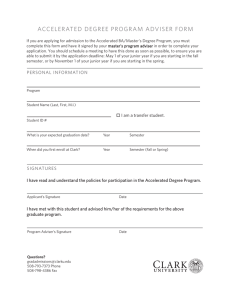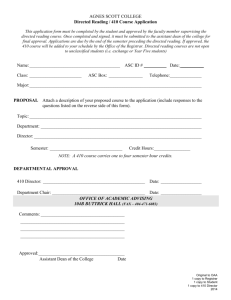ACDEANINST 1531.59B 2/ADAA 13 Mar 97
advertisement
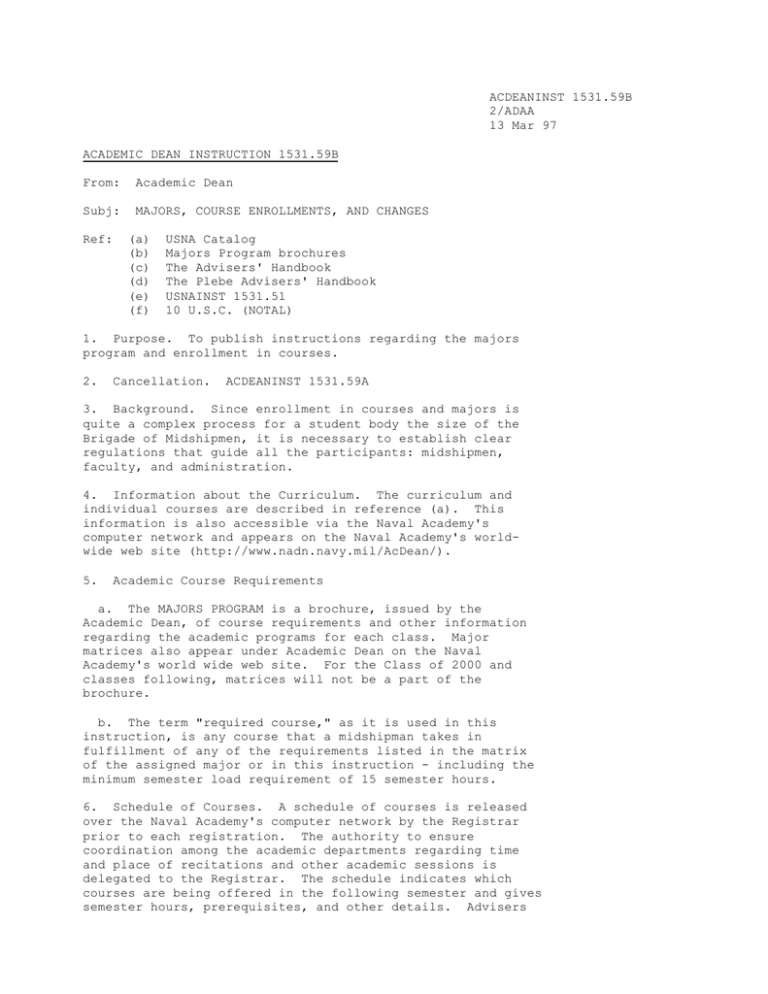
ACDEANINST 1531.59B 2/ADAA 13 Mar 97 ACADEMIC DEAN INSTRUCTION 1531.59B From: Academic Dean Subj: MAJORS, COURSE ENROLLMENTS, AND CHANGES Ref: (a) (b) (c) (d) (e) (f) USNA Catalog Majors Program brochures The Advisers' Handbook The Plebe Advisers' Handbook USNAINST 1531.51 10 U.S.C. (NOTAL) 1. Purpose. To publish instructions regarding the majors program and enrollment in courses. 2. Cancellation. ACDEANINST 1531.59A 3. Background. Since enrollment in courses and majors is quite a complex process for a student body the size of the Brigade of Midshipmen, it is necessary to establish clear regulations that guide all the participants: midshipmen, faculty, and administration. 4. Information about the Curriculum. The curriculum and individual courses are described in reference (a). This information is also accessible via the Naval Academy's computer network and appears on the Naval Academy's worldwide web site (http://www.nadn.navy.mil/AcDean/). 5. Academic Course Requirements a. The MAJORS PROGRAM is a brochure, issued by the Academic Dean, of course requirements and other information regarding the academic programs for each class. Major matrices also appear under Academic Dean on the Naval Academy's world wide web site. For the Class of 2000 and classes following, matrices will not be a part of the brochure. b. The term "required course," as it is used in this instruction, is any course that a midshipman takes in fulfillment of any of the requirements listed in the matrix of the assigned major or in this instruction - including the minimum semester load requirement of 15 semester hours. 6. Schedule of Courses. A schedule of courses is released over the Naval Academy's computer network by the Registrar prior to each registration. The authority to ensure coordination among the academic departments regarding time and place of recitations and other academic sessions is delegated to the Registrar. The schedule indicates which courses are being offered in the following semester and gives semester hours, prerequisites, and other details. Advisers and instructors must assure that midshipmen enroll only in courses for which they have necessary prerequisites. 7. Academic Workload a. The normal academic workload for a semester is specified by the matrix of each major program. To take more courses than specified, a midshipman must have his or her academic adviser's approval. More than 23 credits is usually regarded as excessive. b. The minimum academic workload in any semester for a midshipman is 15 semester hours. The Academic Board may authorize a reduced academic workload for midshipmen who have experienced academic difficulty in spite of persistent effort, but who have otherwise demonstrated exceptional potential in other elements of officer performance. The reduction will normally be one course in a given semester and may result in a workload below the normal minimum of 15 credits. The purpose of course reduction is to allow a midshipman to demonstrate that he/she can meet the academic standards at a slower pace. Authorization to continue on the reduced program will depend upon the midshipman's performance each semester. 8. Selection and Change of Major a. During the second semester of fourth class year, the Academic Dean will conduct a registration in which all fourth class midshipmen will indicate a choice of major program. Academic Dean approval of individual choices will depend on the needs of the Navy and the educational background of the midshipmen. When approved by the Academic Dean, this choice will become the assigned major. b. Requests for change of assigned major must be addressed to the Associate Dean for Academic Affairs (ADAA). This request must be processed via the company officer, the academic adviser, the original department senior adviser or chair, and the new department senior adviser or chair. Such requests will not normally be approved if the change in major results in the midshipman falling further behind in the new academic matrix than in the old one. c. Written appeals to decisions of the ADAA concerning changes of major may be addressed to the Academic Dean via the ADAA. 9. Academic Advisers. Midshipmen will contact their academic advisers as soon as possible after the advisers have been assigned and will seek the counsel of advisers whenever academic difficulty is experienced or decisions regarding a midshipman's academic program must be made. Academic advisers are expected to become acquainted with the midshipmen assigned to them, monitor their general academic progress, and offer timely guidance. This applies to both plebe advisers and departmental academic advisers. Advisers are expected to be familiar with general regulations concerning the academic program and specific regulations pertaining to the major program for which they give counsel. References (a) through (d) are of importance in counseling midshipman. 10. Completion of Major a. Satisfactory completion of a major is a requirement for graduation. b. Prior to 1 December each academic department chair will forward to the Registrar, via the division director, a certification of the status of all first class midshipmen majoring in the department with regard to their projected eligibility for graduation. The certification should cover the fulfillment of all course requirements and the 140 semester hour minimum. At the end of the second semester, the Registrar will verify the successful completion of the second semester courses and the attainment of the required overall average (CQPR) of 2.00 for each first classman. 11. Dual Majors a. To be given credit for a second major, a midshipman must complete all the required major and division courses in the second major. In the major course category of the second major, at least five of the courses, totaling a minimum of 15 semester hours credit, must be courses that were not used for credit toward the first major. At least four of these five courses must be at the 300 level or above. The completion of a second major does not constitute eligibility for a second degree, but both majors will be noted on official transcripts. b. General Engineering will not be a second major for a midshipman who completes another engineering major. General Science will not be a second major for a midshipman who completes another major in mathematics or science. c. For his/her primary major, a midshipman is automatically assigned an academic adviser. Those who pursue a second major may request an additional adviser in the second field but, in any case, must report the intention to pursue the second major to the department concerned. 12. Preregistration and Registration a. The Registrar or ADAA will publish times and procedures for preregistration and registration. The purpose of preregistration is to permit midshipmen to indicate their selection of courses for the next semester and to provide information to the departments so that they may plan for the next semester. The purpose of registration is to afford the midshipmen the opportunity to select their instructors and schedules for the next semester. Midshipmen are responsible for seeking counsel from their advisers and preregistering on time. It is important for midshipmen to choose their courses wisely and to take care that they will have completed all prerequisites for the courses they wish to take. Company Officers will assist to ensure the timely preregistration of midshipmen in their company. If a midshipman fails to preregister on time, the ADAA may deny registration privileges to that midshipman and, instead, register that midshipman directly without regard to the midshipman's preferences. Failure to preregister will result in a midshipman having no classes for the following semester. b. The Academic Dean, the Commandant, and the Director of Athletics may designate certain midshipmen to be scheduled so that they have no classes during certain periods because of: (1) The demands of assigned activities and duties within the Brigade organization (Commandant of Midshipmen, a maximum of 75 midshipmen). (2) Special scheduling problems involved with certain majors during certain semesters (Academic Dean, a maximum of 75 midshipmen). (3) Scheduling limitations imposed by participation in certain varsity sports (Director of Athletics, a maximum of 250 midshipmen). c. The Registrar will place all midshipmen into classes for each semester taking into account special requests to block certain periods as described in subparagraph c above as well as the requirements of the academic departments. When registration is complete, the Registrar will make the results available to midshipmen, the faculty, and the administration. d. Midshipmen may preregister or be registered only for those courses approved by their academic advisers. The Registrar will permit course changes between preregistration and registration only with the approval of the advising department. In the case of changes to registration for either semester, the midshipman requesting a change must submit the written approval of the academic adviser or an authorized representative of the advising department. In the case of first classmen, the approval shall assure that the change request will have no adverse effect on requirements for graduation. 13. Changes to Academic Program after Registration a. To make changes in their academic programs, midshipmen must consult their academic advisers and then have the departmental senior academic adviser submit the appropriate Midshipman Record Change Card (MIDRECC) in accordance with the following table: (1) To drop a course*, the following approval is Prior to the end of the week in which second period grades are posted. MIDREC approval by Acad Adviser and ADAA The approval of the ADAA is required only if means falling behind the matrix program. No required: marking the drop grade or record is retained for courses dropped prior to the first marking period. Drops after this date require the notation W (withdrawn) and approval of the ADAA. *A midshipman 1/C who drops or withdraws from a course in either term of first class year must have a statement on the MIDREC card that "this change will not prevent my scheduled graduation." (2) To add a course, the follwing approval is required: Prior to the 15th calendar day of semester. MIDREC approval by Acad Adviser, Course Instr, Chair of dept concerned, and Sched Officer. Approval of the departmental chair is required. (This approval function may be delegated to the individual chair, solely at his/her option.) After the first 14 calendar days of a semester, a course may be added only with the approval of the ADAA. (3) Change of Section or Division: No time limitation. MIDREC approval by Chair of dept concerned and Sched Officer Changes of section to select or avoid a particular instructor are not allowed unless the midshipman had the instructor previously. MIDRECCs must be delivered in person to the Scheduling Officer prior to the indicated time limits. Changes to a midshipman's registration which are scheduling conveniences for the midshipman will not normally be allowed. b. In certain subjects, differences of intensity or enrichment may be reflected by offering two or more different courses covering basically the same material. Where progress in such a course indicates a midshipman would be more suitably placed in a different level, this change may be made by the chair of the department teaching the course by submitting the appropriate MIDRECCs (Drop and Add a Course). In this case, the time limits in paragraph 13a do not apply. c. Because the academic program at the Naval Academy is very tightly constrained, midshipmen and their advisers are cautioned to avoid any changes to a midshipman's academic program which will put that midshipman behind the prescribed matrix for his/her major. d. Changes to a midshipman's academic program that are directed by the Academic Board or the Academic Dean are not subject to the restrictions of paragraph 13a. 14. Auditing a Course. Courses may be audited by midshipmen with the written approval of the course instructor, the midshipman's academic adviser, and the chair of the academic department concerned. Formal enrollment with the Registrar is not required, and no grades or credit will be given. To change from audit status to credit status, a midshipman must follow the procedure for adding a course, and such a change is subject to the limitations in paragraph 13a. 15. Validation a. The process by which credit is awarded for previous work equivalent to that covered in courses in the Naval Academy curriculum is known as validation. Any academic course in the curriculum (except SM005, HE101, and SY100) may be validated. Most validation occurs during fourth class summer. However, validation may take place at any time mutually convenient to the department and the midshipman. Arrangements for validation are to be made by the midshipman with the chair of the department teaching the course, and must be approved by the Associate Dean for Academic Affairs (ADAA). b. An F grade in a Naval Academy course may not be removed by validation nor by reexamination. c. Validation of a course may be revoked either at the request of the midshipman or the academic department giving the course, if the midshipman's progress in a sequential course indicates the need for reversion to a lower-level course. This action requires approval of the midshipman's academic adviser and the chair of the department concerned. Validation is also removed from the midshipman's record upon enrollment in and completion of the validated course or an equivalent course, as determined by the department involved. 16. Repeat Courses a. Only courses in which a grade of D or F has been assigned may be repeated for credit. The grade achieved upon repeating a course, or completing an equivalent course as determined by the department involved, replaces the original grade for the course in the computation of the Cumulative QPR and the Professional/Military Cumulative QPR. The original grade is converted to an RD or RF to signify the repeat. b. A repeated course is not counted toward the bonus coefficient for overloading as outlined in reference (e). 17. Readmitted Midshipmen When a midshipman is readmitted to the Naval Academy after separation, assignment to the appropriate class is determined by the Academic Board upon the recommendation of the Academic Dean as outlined in reference (f). ROBERT H. SHAPIRO Distribution: OF,MR
